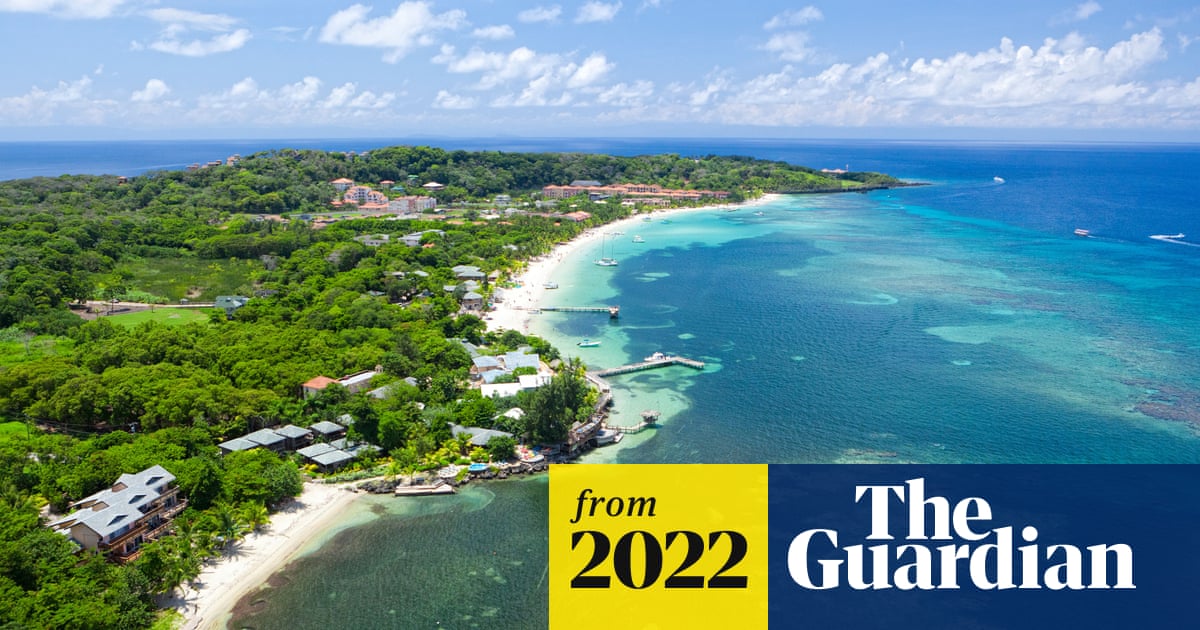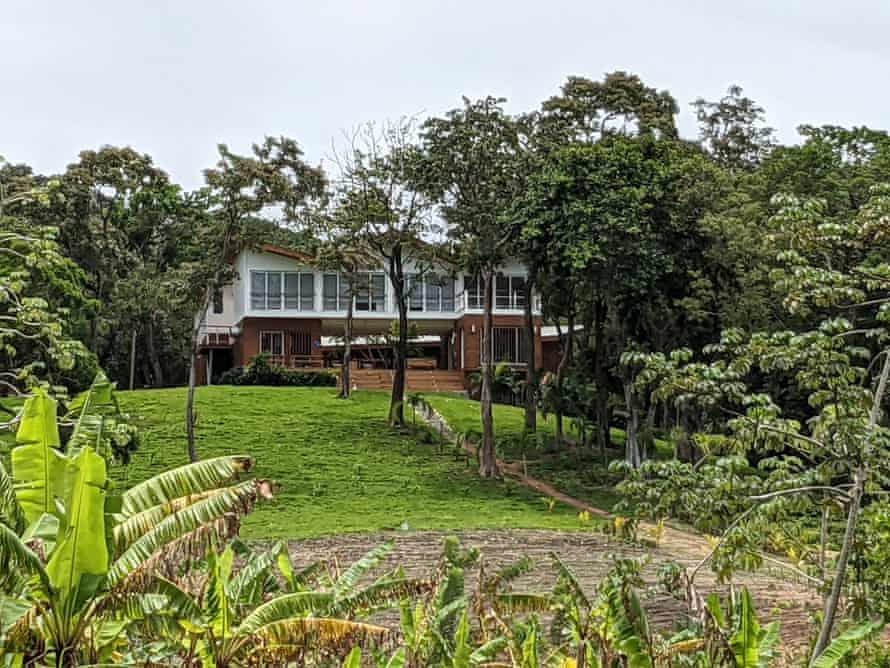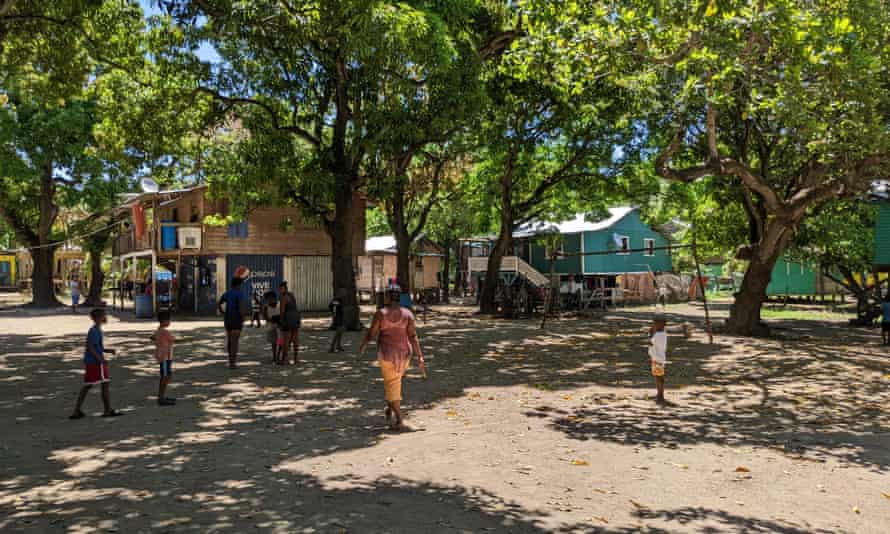
‘Go home’: Honduran islanders fight against crypto colonialists
The battle over land rights and sovereignty on the island of Roatán has galvanized the whole country
Jeff Ernst in Crawfish Rock
Tue 5 Jul 2022 05.00 EDT

Aerial view of the island of Roatán's West Bay beach. Photograph: Devon Stephens/Alamy
The battle over land rights and sovereignty on the island of Roatán has galvanized the whole country
Straight ahead of Wilford Webster’s hilltop home, waves break over the turquoise waters that surround the reefs offshore.
“Look at this,” he said, his arms framing the panorama. “Who wouldn’t want this?”
To the left, is the community of Crawfish Rock, a few hundred people of mostly English-speaking Black Caribbean descent who live in raised, wood-slat homes on ancestral land.
To the right, there is a security booth with cameras, a gate and a guard. Just beyond that, a prototype residence and the headquarters of a controversial startup city sit amid a landscape scarred by a bulldozer and deep holes dug for the foundation of the next phase of construction.
Perched on an incline where the road splits the countryside as much as the community, Webster’s home on the island of Roatán is at the center of a battle over land rights and sovereignty that has galvanized Honduras.
It’s also symptomatic of a broader phenomenon throughout the region, where foreigners – often cryptocurrency enthusiasts, libertarians or both – have flocked in recent years, supporting controversial projects – such as the proposed “Bitcoin City” in El Salvador – threatening to displace local residents and drawing comparisons to colonialists.
Webster has a message for the ones who moved in next door: “Go home.”
When the new Honduran government repealed a pair of laws in late April that had allowed for the creation of semi-autonomous zones called a Zede, it sent a similar message. But investors in the Zede on Roatán, known as Honduras Próspera, have challenged the move.
“When investing in Honduras, Honduras Próspera, Inc. relied on specific legal stability guarantees from Honduras that the rights and authorities provided by the Zede legal framework would remain in effect as to Próspera for many decades,” wrote investors in a statement published on 4 May, adding that they expect “Honduras to respect its commitments under legal stability agreements and international treaties.”
The result is a standoff in which investors are gambling with millions, the government could be at risk of a costly lawsuit and the fate of the affected communities hangs in the balance.
The controversy dates back roughly a decade, when the Honduran government reformed the constitution and passed a law that paved the way for the creation of Employment and Economic Development Zones (Zede). The idea was ripped from economist Paul Romer’s proposal of charter cities, which the Nobel-prize winner theorized could promote development in areas plagued by poor governance.
Romer proposed that a foreign nation act as a guarantor for the governance of charter cities. But the Honduran law instead allowed corporations to build a private city.
The issue fell into the background until 2020, when word spread that the first charter city had been established in Crawfish Rock – to the surprise of the village’s residents. “We didn’t even know what a Zede was,” said Luisa Connor, president of the local community association.
Investors had first appeared in Crawfish Rock about three years before as a charitable foundation, opening a community center and talking about plans to build a tourist center nearby. Residents said they saw no reason to be suspicious.
“It’s not anything out of the way for people to come and start building around us or starting projects,” said Connor.
Roatán, located about 65 kilometers (40 miles) north of the mainland, is one of the Caribbean’s top tourist destinations and an expat haven, renowned for its white-sand beaches and world-class diving. Up and down the beach, there are vacation homes and resorts owned by foreigners.

The headquarters of the Próspera Zede sits on a hill overlooking the ocean. Photograph: Jeff Ernst
Representatives of Próspera have said that they informed the community of their intentions in June 2019, citing a document that was signed by a couple dozen residents that contains the word Zede, but doesn’t explain what it is. “They deceived us big time,” said Connor.
Further enflaming the situation, Própsera posted on its website drawings of three stages of expansion that appeared to include the center of Crawfish Rock within its jurisdiction, stoking fears that investors could invoke a legal clause that would allow for the expropriation of the land the community has lived on for generations. Representatives of Próspera promised that they would not go that route, but their words provided little comfort.
As the controversy spread across the nation, a movement was born that demanded the protection of land rights and decried the concession of sovereign territory to foreigners and corporations.
President Xiomara Castro, who was elected in a landslide in November, made the Zede a signature issue of her campaign. When Castro sanctioned the repeal in April, she called it the most important day in her presidency thus far.
For the people of Crawfish Rock, it most certainly was. “Words cannot describe how happy we were,” said Connor.

The center of Crawfish Rock where community members gather and children play. Photograph: Jeff Ernst
But the elation was short-lived. Just before the repeal, Próspera announced a new round of investments totaling $60m and the adoption of the cryptocurrency bitcoin as legal tender. In the weeks and months since, the company has continued to operate as if nothing has changed, moving ahead with construction projects and clinging to their plan to build a libertarian oasis of sorts.
Government officials said that any Zede currently operating has one year to conform to another kind of legal framework. But investors cite a sunset clause in the Zede law that gives them a term of at least 10 years, as well as other international trade agreements that they claim grants them decades more.
Legal analysts consulted by the Guardian suggested that in order to avoid a lawsuit, the government could either strike an agreement with investors, or challenge whether the Zedes were created in strict accordance with the now repealed law.
“I emphatically believe that the repeal is good, but it does not end here,” said Gustavo Solórzano, legal adviser for Cohep, the country’s largest chamber of commerce. “Now the state has to review these concessions and it would be best for the state to verify if all the legal requirements were met and if not, proceed to cancel the concessions delivered.”
Meanwhile, the residents of Crawfish Rock remain vigilant. “We have our eyes open,” said Connor. “We don’t trust no one.”
Last edited:



